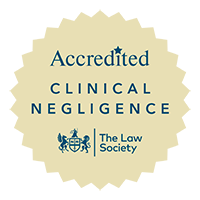Top ranked cerebral palsy claims lawyers
NHS Resolution, the newly rebranded NHS Litigation Authority, has issued a leaflet for healthcare practitioners about the importance of saying sorry when things go wrong.
In an open demonstration of NHS Resolution’s new focus on upstream intervention to “support candour and learning to address the rising costs of harm in the NHS”, the new guidance leaflet, Saying Sorry, sets the record straight about NHS Resolution’s stance on apologies.
It emphasises at the outset that saying sorry is always the right thing to do on moral, statutory, regulatory and professional grounds. That means that it is a requirement both by law and as a condition of the healthcare practitioner’s professional registration to make an apology when it is due.
The final message on the back cover of the leaflet cites the NHS Constitution which gives patients the following rights:
- an open and transparent relationship with the organisation providing their care.
- to be told about any safety incident relating to their care which, in the opinion of a healthcare professional, has caused or could still cause significant harm or death.
- to be given the facts, an apology, and any reasonable support they need when something has gone wrong.
In the same document, NHS staff are told; “You should aim to be open with patients…if anything goes wrong; welcoming and listening to feedback and addressing concerns promptly and in the spirit of cooperation.” So, saying sorry is a requirement of their employment too.
Saying sorry is also cited as a means of supporting learning and improving patient safety. As I’ve mentioned frequently in recent posts, willingness to face up to and own up to mistakes is a key factor in the creation of the learning culture that forms such a central part of the Department of Health’s vision for the NHS.
Deficiencies in the Serious Incident Reporting Framework, the NHS Complaints Procedure and the findings of the recent Safe Space Consultation show clearly that as a learning culture, the NHS still has a very long way to go.
There is already a statutory Duty of Candour which requires healthcare practitioners as individuals to act in an open and transparent way, make a written record and inform and support patients through the next steps when a notifiable safety incident has occurred. This includes making an apology.
On an institutional level, the practice of the Duty of Candour is regulated by the Care Quality Commission, who welcomed it, saying; “The introduction of a duty of candour is an important step towards ensuring the open, honest and transparent culture that was lacking at Mid Staffordshire NHS Foundation Trust. The failures at Winterbourne View Hospital revealed that there were no levers in the system to hold the “controlling mind” of organisations to account. It is essential that CQC uses this new power to encourage a culture of openness and to hold providers and directors to account.”
With the legal and regulatory framework so clearly in place, you might ask why NHS Resolution needed to give guidance on saying sorry. It might be that with all the focus on lawyers and litigation there is a misunderstanding about apologies and what they do and don’t mean.
NHS Resolution has already identified in its business plan that delays in providing information after something goes wrong can lead to ‘frustration claims’ – where otherwise non-litigious patients seek advice from a solicitor because they can’t obtain their information any other way. In advising healthcare practitioners to seek out the patient or their family as soon as possible after the practitioner (rather than the patient) becomes aware that something has gone wrong, Saying Sorry, reiterates this advice. The guidance specifically says that the existence of a complaint or a claim should never prevent or delay an apology being made.
This is because an apology is not the same as an admission of liability. It is a human, caring response when someone has made a mistake.
The Compensation Act 2006 says,
“An apology, an offer of treatment or other redress, shall not of itself amount to an admission of negligence, or breach of statutory duty.” Saying Sorry ends with an assurance from NHS Resolution, “We have never, and will never, refuse cover on a claim because an apology has been given.”
In Saying Sorry, NHS Resolution has started as ‘upstream’ as it gets, by leaving liability to the lawyers and urging practitioners to focus on care. That means saying sorry when we make a mistake.
They have a great deal of knowledge and expertise, and client care seems to be their top priority.
Chambers Guide to the Legal Profession
Contact our expert Cerebral Palsy solicitors today for support with your claim




